The UK Housing Crisis: Causes, Effects, and Potential Solutions
VerifiedAdded on 2020/10/22
|10
|3073
|231
Report
AI Summary
This report provides a comprehensive analysis of the housing crisis in the UK and London, examining the key factors contributing to the shortage of affordable housing. It delves into the causes, including the imbalance between house price increases and income growth, government policies like lower interest rates, and the impact of population growth. The report highlights the inverse relationship between house prices and income, the role of government interventions, and the decline in house building. It further discusses the impact of these factors on housing affordability and the potential for a housing bubble. The report concludes by emphasizing the need for increased housing supply and affordable prices to address the crisis. The analysis covers historical trends, economic factors, and policy implications, providing a detailed overview of the challenges and potential solutions within the UK housing market. The report highlights the problem of insufficient supply of houses relative to the demand, which is further exacerbated by government policies and population growth.

Assessment
Paraphrase This Document
Need a fresh take? Get an instant paraphrase of this document with our AI Paraphraser

Table of Contents
INTRODUCTION...........................................................................................................................1
MAIN BODY...................................................................................................................................1
CONCLUSION ..............................................................................................................................7
REFERENCES................................................................................................................................8
INTRODUCTION...........................................................................................................................1
MAIN BODY...................................................................................................................................1
CONCLUSION ..............................................................................................................................7
REFERENCES................................................................................................................................8
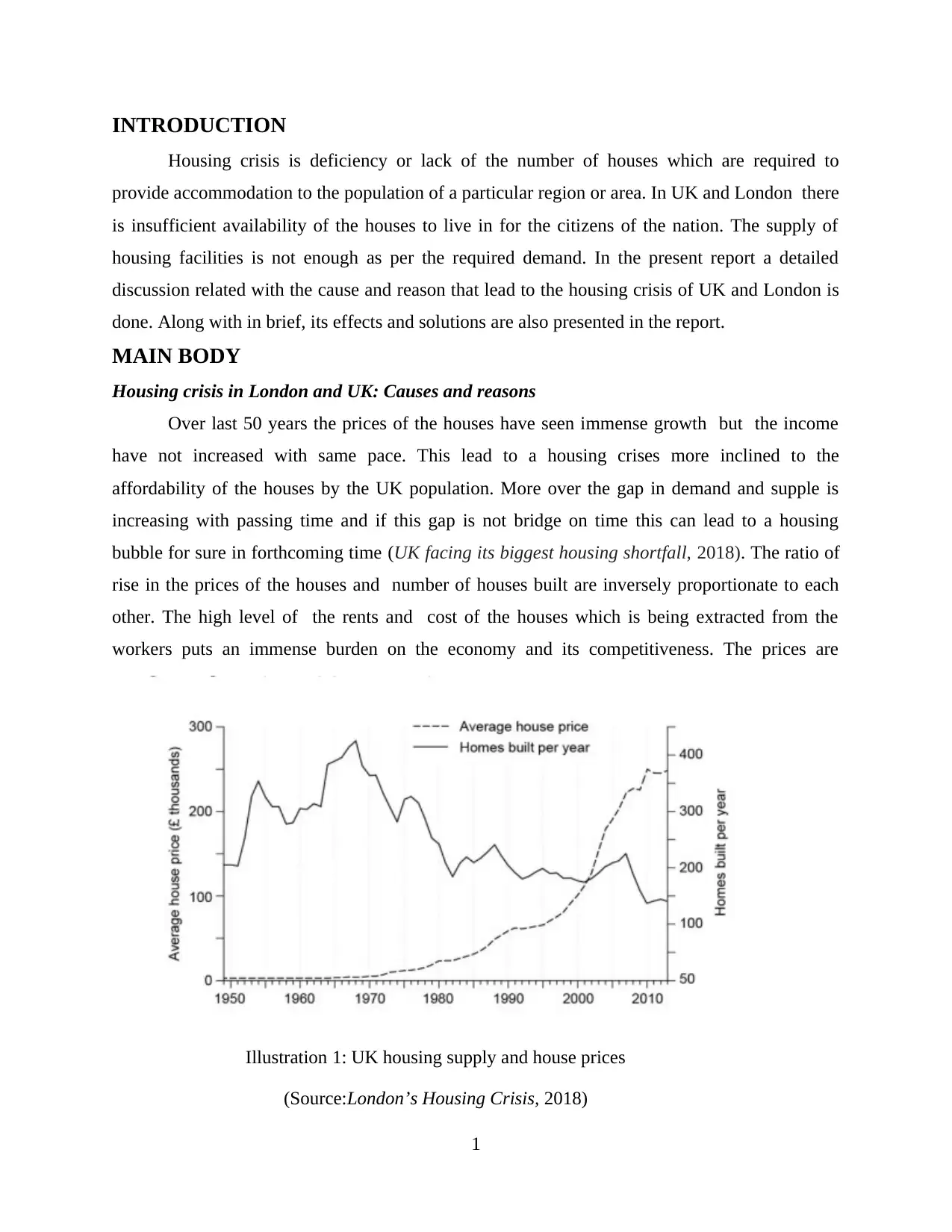
INTRODUCTION
Housing crisis is deficiency or lack of the number of houses which are required to
provide accommodation to the population of a particular region or area. In UK and London there
is insufficient availability of the houses to live in for the citizens of the nation. The supply of
housing facilities is not enough as per the required demand. In the present report a detailed
discussion related with the cause and reason that lead to the housing crisis of UK and London is
done. Along with in brief, its effects and solutions are also presented in the report.
MAIN BODY
Housing crisis in London and UK: Causes and reasons
Over last 50 years the prices of the houses have seen immense growth but the income
have not increased with same pace. This lead to a housing crises more inclined to the
affordability of the houses by the UK population. More over the gap in demand and supple is
increasing with passing time and if this gap is not bridge on time this can lead to a housing
bubble for sure in forthcoming time (UK facing its biggest housing shortfall, 2018). The ratio of
rise in the prices of the houses and number of houses built are inversely proportionate to each
other. The high level of the rents and cost of the houses which is being extracted from the
workers puts an immense burden on the economy and its competitiveness. The prices are
1
Illustration 1: UK housing supply and house prices
(Source:London’s Housing Crisis, 2018)
Housing crisis is deficiency or lack of the number of houses which are required to
provide accommodation to the population of a particular region or area. In UK and London there
is insufficient availability of the houses to live in for the citizens of the nation. The supply of
housing facilities is not enough as per the required demand. In the present report a detailed
discussion related with the cause and reason that lead to the housing crisis of UK and London is
done. Along with in brief, its effects and solutions are also presented in the report.
MAIN BODY
Housing crisis in London and UK: Causes and reasons
Over last 50 years the prices of the houses have seen immense growth but the income
have not increased with same pace. This lead to a housing crises more inclined to the
affordability of the houses by the UK population. More over the gap in demand and supple is
increasing with passing time and if this gap is not bridge on time this can lead to a housing
bubble for sure in forthcoming time (UK facing its biggest housing shortfall, 2018). The ratio of
rise in the prices of the houses and number of houses built are inversely proportionate to each
other. The high level of the rents and cost of the houses which is being extracted from the
workers puts an immense burden on the economy and its competitiveness. The prices are
1
Illustration 1: UK housing supply and house prices
(Source:London’s Housing Crisis, 2018)
⊘ This is a preview!⊘
Do you want full access?
Subscribe today to unlock all pages.

Trusted by 1+ million students worldwide
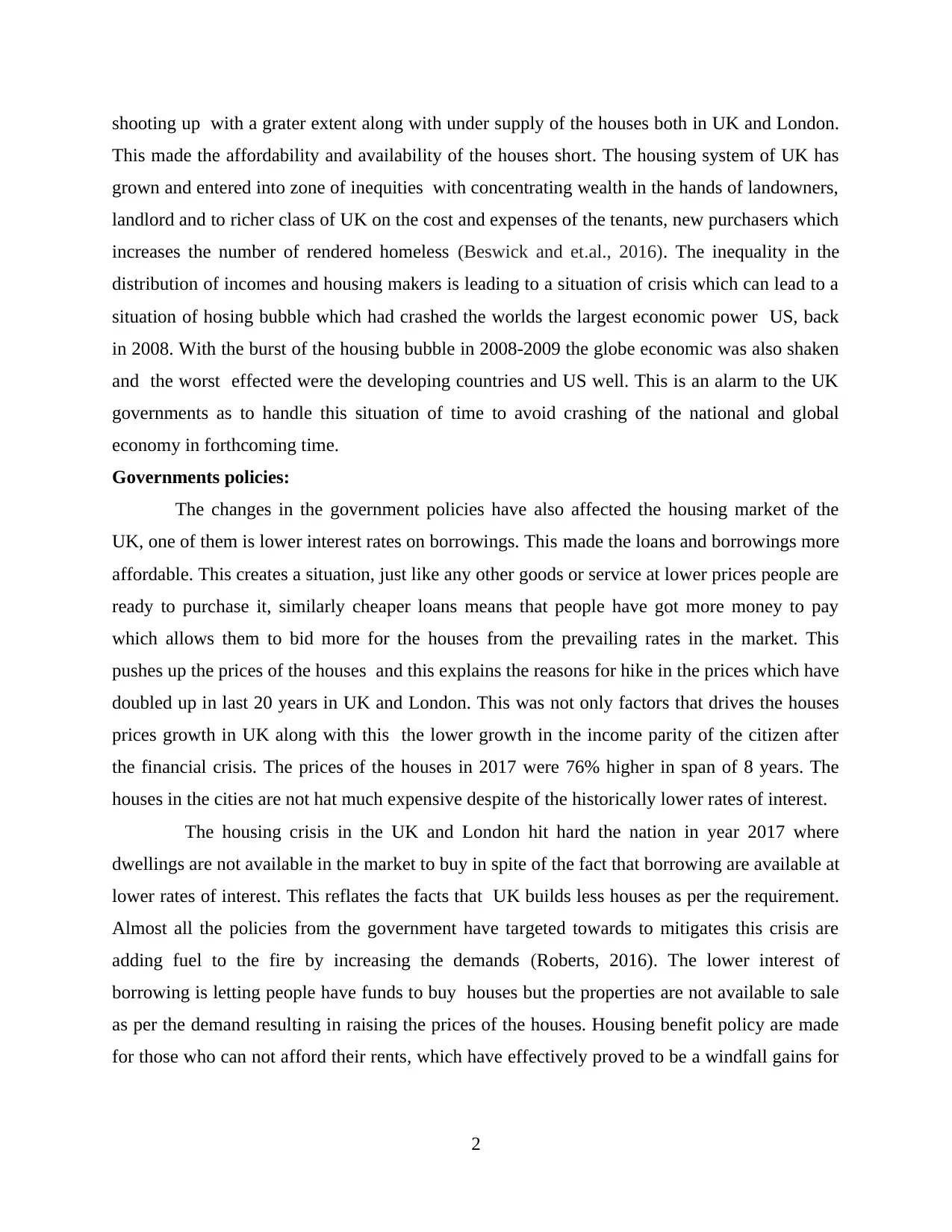
shooting up with a grater extent along with under supply of the houses both in UK and London.
This made the affordability and availability of the houses short. The housing system of UK has
grown and entered into zone of inequities with concentrating wealth in the hands of landowners,
landlord and to richer class of UK on the cost and expenses of the tenants, new purchasers which
increases the number of rendered homeless (Beswick and et.al., 2016). The inequality in the
distribution of incomes and housing makers is leading to a situation of crisis which can lead to a
situation of hosing bubble which had crashed the worlds the largest economic power US, back
in 2008. With the burst of the housing bubble in 2008-2009 the globe economic was also shaken
and the worst effected were the developing countries and US well. This is an alarm to the UK
governments as to handle this situation of time to avoid crashing of the national and global
economy in forthcoming time.
Governments policies:
The changes in the government policies have also affected the housing market of the
UK, one of them is lower interest rates on borrowings. This made the loans and borrowings more
affordable. This creates a situation, just like any other goods or service at lower prices people are
ready to purchase it, similarly cheaper loans means that people have got more money to pay
which allows them to bid more for the houses from the prevailing rates in the market. This
pushes up the prices of the houses and this explains the reasons for hike in the prices which have
doubled up in last 20 years in UK and London. This was not only factors that drives the houses
prices growth in UK along with this the lower growth in the income parity of the citizen after
the financial crisis. The prices of the houses in 2017 were 76% higher in span of 8 years. The
houses in the cities are not hat much expensive despite of the historically lower rates of interest.
The housing crisis in the UK and London hit hard the nation in year 2017 where
dwellings are not available in the market to buy in spite of the fact that borrowing are available at
lower rates of interest. This reflates the facts that UK builds less houses as per the requirement.
Almost all the policies from the government have targeted towards to mitigates this crisis are
adding fuel to the fire by increasing the demands (Roberts, 2016). The lower interest of
borrowing is letting people have funds to buy houses but the properties are not available to sale
as per the demand resulting in raising the prices of the houses. Housing benefit policy are made
for those who can not afford their rents, which have effectively proved to be a windfall gains for
2
This made the affordability and availability of the houses short. The housing system of UK has
grown and entered into zone of inequities with concentrating wealth in the hands of landowners,
landlord and to richer class of UK on the cost and expenses of the tenants, new purchasers which
increases the number of rendered homeless (Beswick and et.al., 2016). The inequality in the
distribution of incomes and housing makers is leading to a situation of crisis which can lead to a
situation of hosing bubble which had crashed the worlds the largest economic power US, back
in 2008. With the burst of the housing bubble in 2008-2009 the globe economic was also shaken
and the worst effected were the developing countries and US well. This is an alarm to the UK
governments as to handle this situation of time to avoid crashing of the national and global
economy in forthcoming time.
Governments policies:
The changes in the government policies have also affected the housing market of the
UK, one of them is lower interest rates on borrowings. This made the loans and borrowings more
affordable. This creates a situation, just like any other goods or service at lower prices people are
ready to purchase it, similarly cheaper loans means that people have got more money to pay
which allows them to bid more for the houses from the prevailing rates in the market. This
pushes up the prices of the houses and this explains the reasons for hike in the prices which have
doubled up in last 20 years in UK and London. This was not only factors that drives the houses
prices growth in UK along with this the lower growth in the income parity of the citizen after
the financial crisis. The prices of the houses in 2017 were 76% higher in span of 8 years. The
houses in the cities are not hat much expensive despite of the historically lower rates of interest.
The housing crisis in the UK and London hit hard the nation in year 2017 where
dwellings are not available in the market to buy in spite of the fact that borrowing are available at
lower rates of interest. This reflates the facts that UK builds less houses as per the requirement.
Almost all the policies from the government have targeted towards to mitigates this crisis are
adding fuel to the fire by increasing the demands (Roberts, 2016). The lower interest of
borrowing is letting people have funds to buy houses but the properties are not available to sale
as per the demand resulting in raising the prices of the houses. Housing benefit policy are made
for those who can not afford their rents, which have effectively proved to be a windfall gains for
2
Paraphrase This Document
Need a fresh take? Get an instant paraphrase of this document with our AI Paraphraser
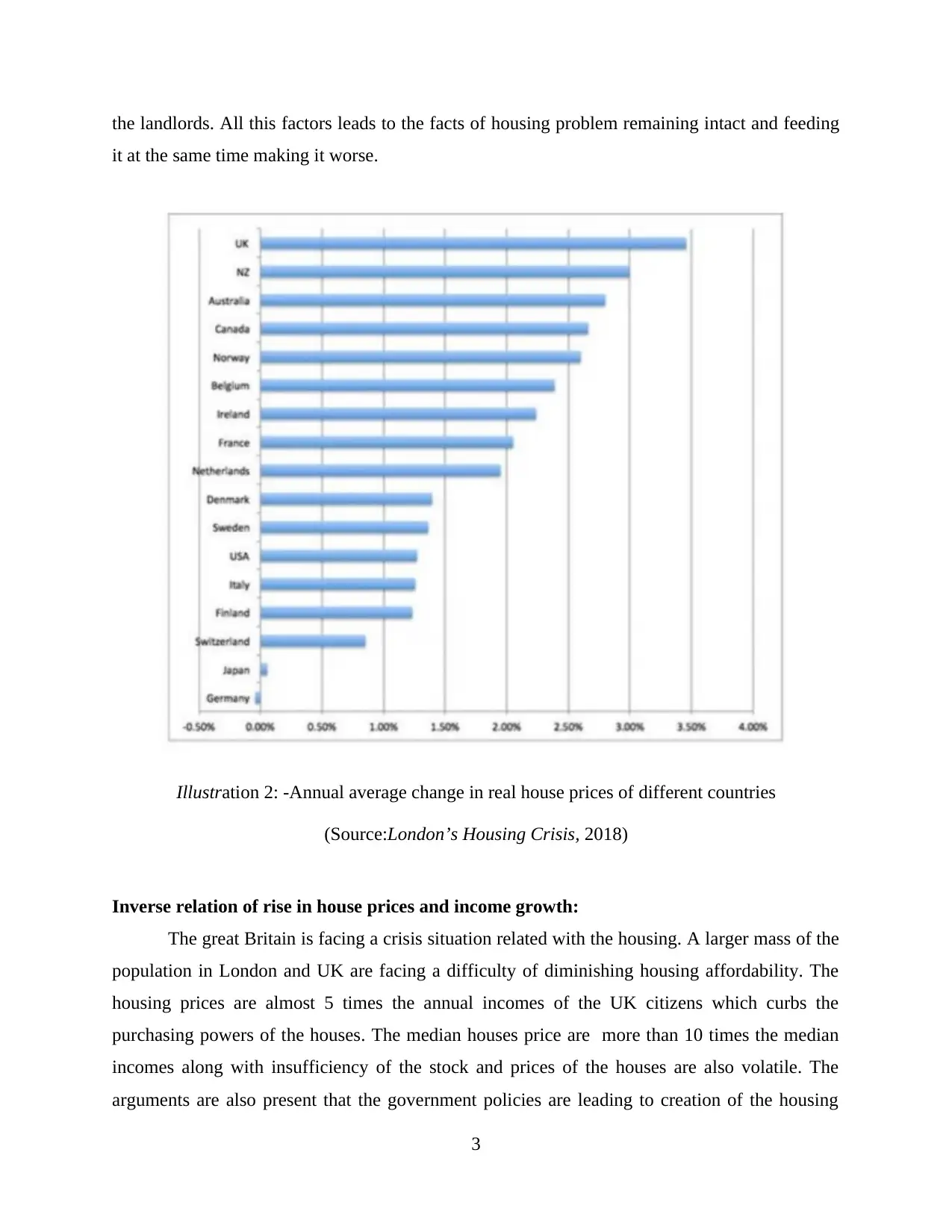
the landlords. All this factors leads to the facts of housing problem remaining intact and feeding
it at the same time making it worse.
Illustration 2: -Annual average change in real house prices of different countries
(Source:London’s Housing Crisis, 2018)
Inverse relation of rise in house prices and income growth:
The great Britain is facing a crisis situation related with the housing. A larger mass of the
population in London and UK are facing a difficulty of diminishing housing affordability. The
housing prices are almost 5 times the annual incomes of the UK citizens which curbs the
purchasing powers of the houses. The median houses price are more than 10 times the median
incomes along with insufficiency of the stock and prices of the houses are also volatile. The
arguments are also present that the government policies are leading to creation of the housing
3
it at the same time making it worse.
Illustration 2: -Annual average change in real house prices of different countries
(Source:London’s Housing Crisis, 2018)
Inverse relation of rise in house prices and income growth:
The great Britain is facing a crisis situation related with the housing. A larger mass of the
population in London and UK are facing a difficulty of diminishing housing affordability. The
housing prices are almost 5 times the annual incomes of the UK citizens which curbs the
purchasing powers of the houses. The median houses price are more than 10 times the median
incomes along with insufficiency of the stock and prices of the houses are also volatile. The
arguments are also present that the government policies are leading to creation of the housing
3
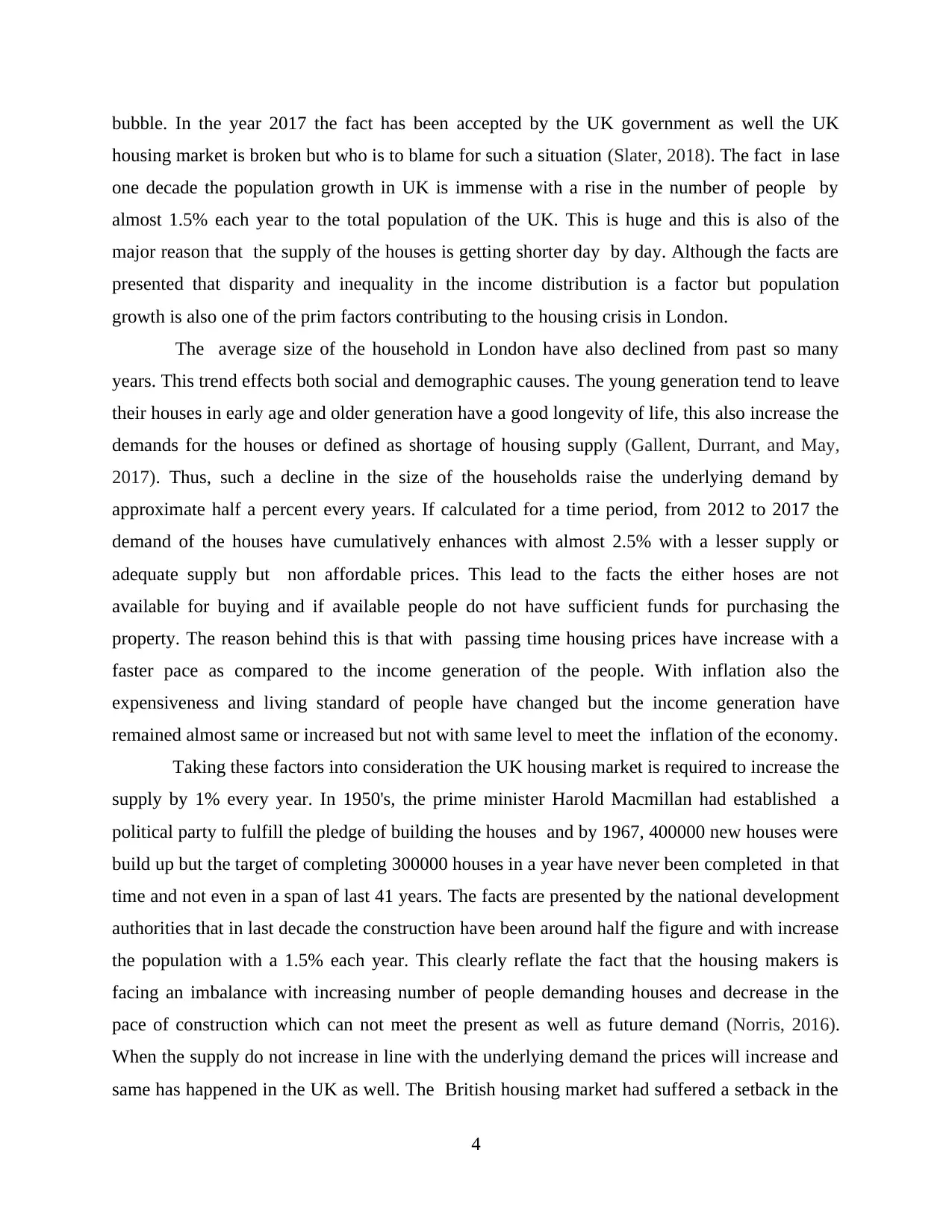
bubble. In the year 2017 the fact has been accepted by the UK government as well the UK
housing market is broken but who is to blame for such a situation (Slater, 2018). The fact in lase
one decade the population growth in UK is immense with a rise in the number of people by
almost 1.5% each year to the total population of the UK. This is huge and this is also of the
major reason that the supply of the houses is getting shorter day by day. Although the facts are
presented that disparity and inequality in the income distribution is a factor but population
growth is also one of the prim factors contributing to the housing crisis in London.
The average size of the household in London have also declined from past so many
years. This trend effects both social and demographic causes. The young generation tend to leave
their houses in early age and older generation have a good longevity of life, this also increase the
demands for the houses or defined as shortage of housing supply (Gallent, Durrant, and May,
2017). Thus, such a decline in the size of the households raise the underlying demand by
approximate half a percent every years. If calculated for a time period, from 2012 to 2017 the
demand of the houses have cumulatively enhances with almost 2.5% with a lesser supply or
adequate supply but non affordable prices. This lead to the facts the either hoses are not
available for buying and if available people do not have sufficient funds for purchasing the
property. The reason behind this is that with passing time housing prices have increase with a
faster pace as compared to the income generation of the people. With inflation also the
expensiveness and living standard of people have changed but the income generation have
remained almost same or increased but not with same level to meet the inflation of the economy.
Taking these factors into consideration the UK housing market is required to increase the
supply by 1% every year. In 1950's, the prime minister Harold Macmillan had established a
political party to fulfill the pledge of building the houses and by 1967, 400000 new houses were
build up but the target of completing 300000 houses in a year have never been completed in that
time and not even in a span of last 41 years. The facts are presented by the national development
authorities that in last decade the construction have been around half the figure and with increase
the population with a 1.5% each year. This clearly reflate the fact that the housing makers is
facing an imbalance with increasing number of people demanding houses and decrease in the
pace of construction which can not meet the present as well as future demand (Norris, 2016).
When the supply do not increase in line with the underlying demand the prices will increase and
same has happened in the UK as well. The British housing market had suffered a setback in the
4
housing market is broken but who is to blame for such a situation (Slater, 2018). The fact in lase
one decade the population growth in UK is immense with a rise in the number of people by
almost 1.5% each year to the total population of the UK. This is huge and this is also of the
major reason that the supply of the houses is getting shorter day by day. Although the facts are
presented that disparity and inequality in the income distribution is a factor but population
growth is also one of the prim factors contributing to the housing crisis in London.
The average size of the household in London have also declined from past so many
years. This trend effects both social and demographic causes. The young generation tend to leave
their houses in early age and older generation have a good longevity of life, this also increase the
demands for the houses or defined as shortage of housing supply (Gallent, Durrant, and May,
2017). Thus, such a decline in the size of the households raise the underlying demand by
approximate half a percent every years. If calculated for a time period, from 2012 to 2017 the
demand of the houses have cumulatively enhances with almost 2.5% with a lesser supply or
adequate supply but non affordable prices. This lead to the facts the either hoses are not
available for buying and if available people do not have sufficient funds for purchasing the
property. The reason behind this is that with passing time housing prices have increase with a
faster pace as compared to the income generation of the people. With inflation also the
expensiveness and living standard of people have changed but the income generation have
remained almost same or increased but not with same level to meet the inflation of the economy.
Taking these factors into consideration the UK housing market is required to increase the
supply by 1% every year. In 1950's, the prime minister Harold Macmillan had established a
political party to fulfill the pledge of building the houses and by 1967, 400000 new houses were
build up but the target of completing 300000 houses in a year have never been completed in that
time and not even in a span of last 41 years. The facts are presented by the national development
authorities that in last decade the construction have been around half the figure and with increase
the population with a 1.5% each year. This clearly reflate the fact that the housing makers is
facing an imbalance with increasing number of people demanding houses and decrease in the
pace of construction which can not meet the present as well as future demand (Norris, 2016).
When the supply do not increase in line with the underlying demand the prices will increase and
same has happened in the UK as well. The British housing market had suffered a setback in the
4
⊘ This is a preview!⊘
Do you want full access?
Subscribe today to unlock all pages.

Trusted by 1+ million students worldwide
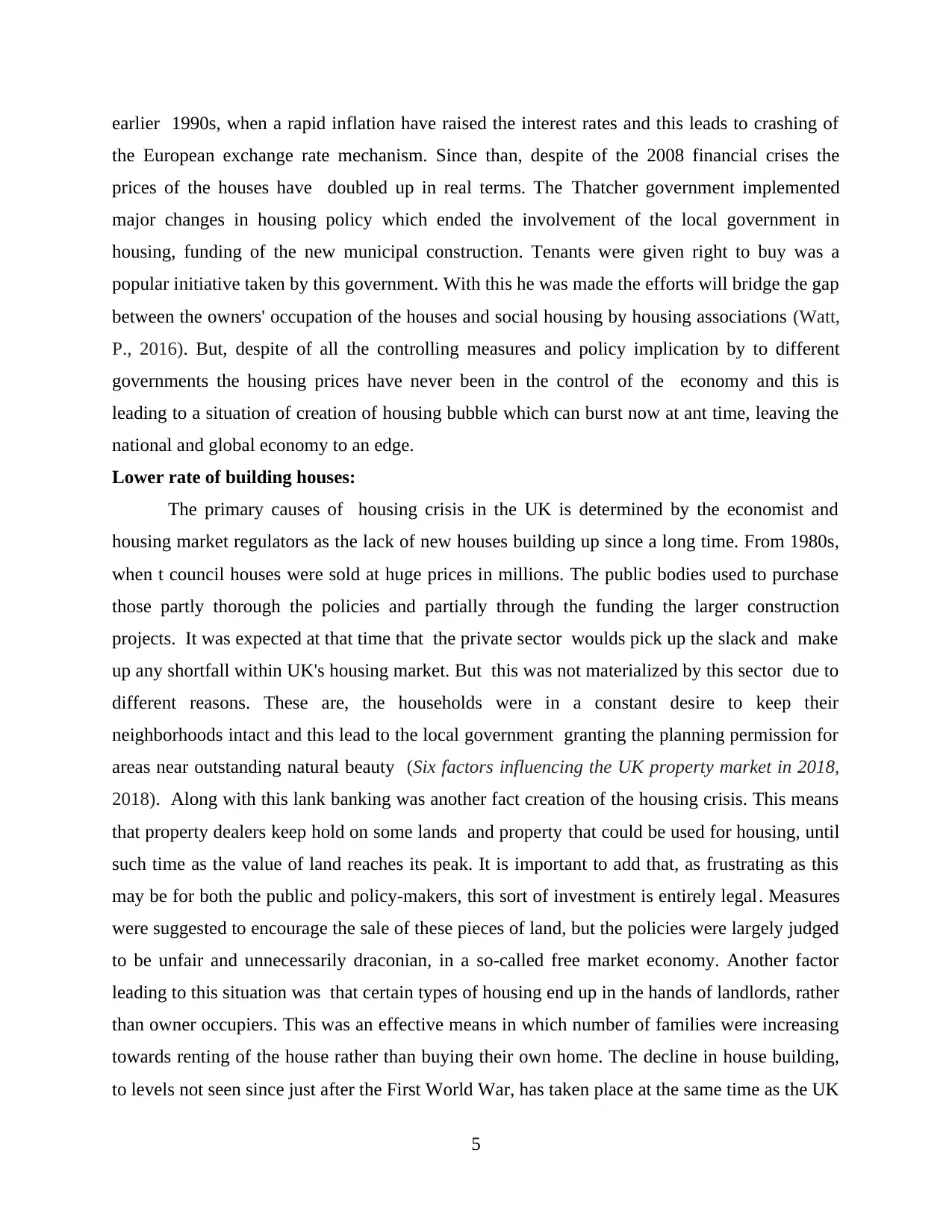
earlier 1990s, when a rapid inflation have raised the interest rates and this leads to crashing of
the European exchange rate mechanism. Since than, despite of the 2008 financial crises the
prices of the houses have doubled up in real terms. The Thatcher government implemented
major changes in housing policy which ended the involvement of the local government in
housing, funding of the new municipal construction. Tenants were given right to buy was a
popular initiative taken by this government. With this he was made the efforts will bridge the gap
between the owners' occupation of the houses and social housing by housing associations (Watt,
P., 2016). But, despite of all the controlling measures and policy implication by to different
governments the housing prices have never been in the control of the economy and this is
leading to a situation of creation of housing bubble which can burst now at ant time, leaving the
national and global economy to an edge.
Lower rate of building houses:
The primary causes of housing crisis in the UK is determined by the economist and
housing market regulators as the lack of new houses building up since a long time. From 1980s,
when t council houses were sold at huge prices in millions. The public bodies used to purchase
those partly thorough the policies and partially through the funding the larger construction
projects. It was expected at that time that the private sector woulds pick up the slack and make
up any shortfall within UK's housing market. But this was not materialized by this sector due to
different reasons. These are, the households were in a constant desire to keep their
neighborhoods intact and this lead to the local government granting the planning permission for
areas near outstanding natural beauty (Six factors influencing the UK property market in 2018,
2018). Along with this lank banking was another fact creation of the housing crisis. This means
that property dealers keep hold on some lands and property that could be used for housing, until
such time as the value of land reaches its peak. It is important to add that, as frustrating as this
may be for both the public and policy-makers, this sort of investment is entirely legal. Measures
were suggested to encourage the sale of these pieces of land, but the policies were largely judged
to be unfair and unnecessarily draconian, in a so-called free market economy. Another factor
leading to this situation was that certain types of housing end up in the hands of landlords, rather
than owner occupiers. This was an effective means in which number of families were increasing
towards renting of the house rather than buying their own home. The decline in house building,
to levels not seen since just after the First World War, has taken place at the same time as the UK
5
the European exchange rate mechanism. Since than, despite of the 2008 financial crises the
prices of the houses have doubled up in real terms. The Thatcher government implemented
major changes in housing policy which ended the involvement of the local government in
housing, funding of the new municipal construction. Tenants were given right to buy was a
popular initiative taken by this government. With this he was made the efforts will bridge the gap
between the owners' occupation of the houses and social housing by housing associations (Watt,
P., 2016). But, despite of all the controlling measures and policy implication by to different
governments the housing prices have never been in the control of the economy and this is
leading to a situation of creation of housing bubble which can burst now at ant time, leaving the
national and global economy to an edge.
Lower rate of building houses:
The primary causes of housing crisis in the UK is determined by the economist and
housing market regulators as the lack of new houses building up since a long time. From 1980s,
when t council houses were sold at huge prices in millions. The public bodies used to purchase
those partly thorough the policies and partially through the funding the larger construction
projects. It was expected at that time that the private sector woulds pick up the slack and make
up any shortfall within UK's housing market. But this was not materialized by this sector due to
different reasons. These are, the households were in a constant desire to keep their
neighborhoods intact and this lead to the local government granting the planning permission for
areas near outstanding natural beauty (Six factors influencing the UK property market in 2018,
2018). Along with this lank banking was another fact creation of the housing crisis. This means
that property dealers keep hold on some lands and property that could be used for housing, until
such time as the value of land reaches its peak. It is important to add that, as frustrating as this
may be for both the public and policy-makers, this sort of investment is entirely legal. Measures
were suggested to encourage the sale of these pieces of land, but the policies were largely judged
to be unfair and unnecessarily draconian, in a so-called free market economy. Another factor
leading to this situation was that certain types of housing end up in the hands of landlords, rather
than owner occupiers. This was an effective means in which number of families were increasing
towards renting of the house rather than buying their own home. The decline in house building,
to levels not seen since just after the First World War, has taken place at the same time as the UK
5
Paraphrase This Document
Need a fresh take? Get an instant paraphrase of this document with our AI Paraphraser
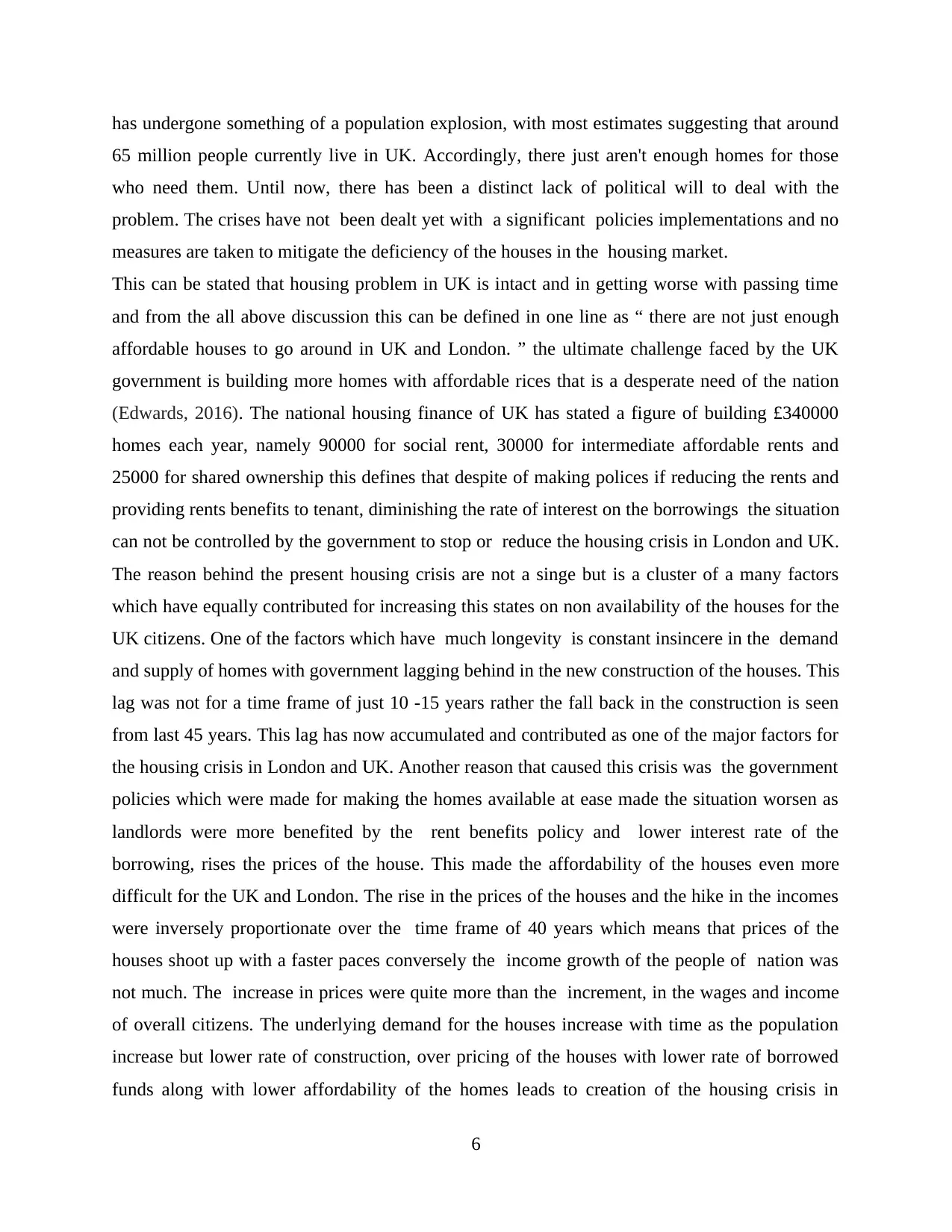
has undergone something of a population explosion, with most estimates suggesting that around
65 million people currently live in UK. Accordingly, there just aren't enough homes for those
who need them. Until now, there has been a distinct lack of political will to deal with the
problem. The crises have not been dealt yet with a significant policies implementations and no
measures are taken to mitigate the deficiency of the houses in the housing market.
This can be stated that housing problem in UK is intact and in getting worse with passing time
and from the all above discussion this can be defined in one line as “ there are not just enough
affordable houses to go around in UK and London. ” the ultimate challenge faced by the UK
government is building more homes with affordable rices that is a desperate need of the nation
(Edwards, 2016). The national housing finance of UK has stated a figure of building £340000
homes each year, namely 90000 for social rent, 30000 for intermediate affordable rents and
25000 for shared ownership this defines that despite of making polices if reducing the rents and
providing rents benefits to tenant, diminishing the rate of interest on the borrowings the situation
can not be controlled by the government to stop or reduce the housing crisis in London and UK.
The reason behind the present housing crisis are not a singe but is a cluster of a many factors
which have equally contributed for increasing this states on non availability of the houses for the
UK citizens. One of the factors which have much longevity is constant insincere in the demand
and supply of homes with government lagging behind in the new construction of the houses. This
lag was not for a time frame of just 10 -15 years rather the fall back in the construction is seen
from last 45 years. This lag has now accumulated and contributed as one of the major factors for
the housing crisis in London and UK. Another reason that caused this crisis was the government
policies which were made for making the homes available at ease made the situation worsen as
landlords were more benefited by the rent benefits policy and lower interest rate of the
borrowing, rises the prices of the house. This made the affordability of the houses even more
difficult for the UK and London. The rise in the prices of the houses and the hike in the incomes
were inversely proportionate over the time frame of 40 years which means that prices of the
houses shoot up with a faster paces conversely the income growth of the people of nation was
not much. The increase in prices were quite more than the increment, in the wages and income
of overall citizens. The underlying demand for the houses increase with time as the population
increase but lower rate of construction, over pricing of the houses with lower rate of borrowed
funds along with lower affordability of the homes leads to creation of the housing crisis in
6
65 million people currently live in UK. Accordingly, there just aren't enough homes for those
who need them. Until now, there has been a distinct lack of political will to deal with the
problem. The crises have not been dealt yet with a significant policies implementations and no
measures are taken to mitigate the deficiency of the houses in the housing market.
This can be stated that housing problem in UK is intact and in getting worse with passing time
and from the all above discussion this can be defined in one line as “ there are not just enough
affordable houses to go around in UK and London. ” the ultimate challenge faced by the UK
government is building more homes with affordable rices that is a desperate need of the nation
(Edwards, 2016). The national housing finance of UK has stated a figure of building £340000
homes each year, namely 90000 for social rent, 30000 for intermediate affordable rents and
25000 for shared ownership this defines that despite of making polices if reducing the rents and
providing rents benefits to tenant, diminishing the rate of interest on the borrowings the situation
can not be controlled by the government to stop or reduce the housing crisis in London and UK.
The reason behind the present housing crisis are not a singe but is a cluster of a many factors
which have equally contributed for increasing this states on non availability of the houses for the
UK citizens. One of the factors which have much longevity is constant insincere in the demand
and supply of homes with government lagging behind in the new construction of the houses. This
lag was not for a time frame of just 10 -15 years rather the fall back in the construction is seen
from last 45 years. This lag has now accumulated and contributed as one of the major factors for
the housing crisis in London and UK. Another reason that caused this crisis was the government
policies which were made for making the homes available at ease made the situation worsen as
landlords were more benefited by the rent benefits policy and lower interest rate of the
borrowing, rises the prices of the house. This made the affordability of the houses even more
difficult for the UK and London. The rise in the prices of the houses and the hike in the incomes
were inversely proportionate over the time frame of 40 years which means that prices of the
houses shoot up with a faster paces conversely the income growth of the people of nation was
not much. The increase in prices were quite more than the increment, in the wages and income
of overall citizens. The underlying demand for the houses increase with time as the population
increase but lower rate of construction, over pricing of the houses with lower rate of borrowed
funds along with lower affordability of the homes leads to creation of the housing crisis in
6
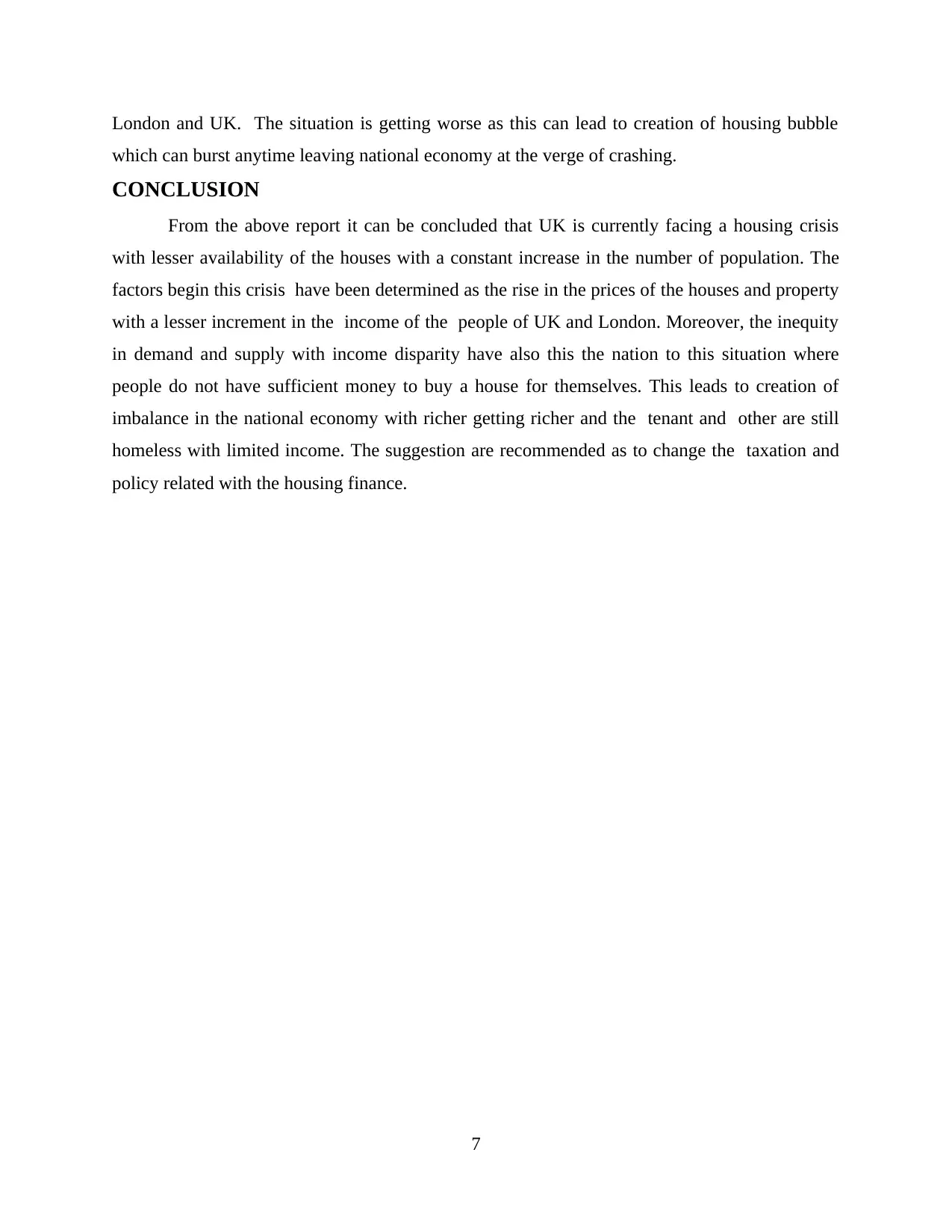
London and UK. The situation is getting worse as this can lead to creation of housing bubble
which can burst anytime leaving national economy at the verge of crashing.
CONCLUSION
From the above report it can be concluded that UK is currently facing a housing crisis
with lesser availability of the houses with a constant increase in the number of population. The
factors begin this crisis have been determined as the rise in the prices of the houses and property
with a lesser increment in the income of the people of UK and London. Moreover, the inequity
in demand and supply with income disparity have also this the nation to this situation where
people do not have sufficient money to buy a house for themselves. This leads to creation of
imbalance in the national economy with richer getting richer and the tenant and other are still
homeless with limited income. The suggestion are recommended as to change the taxation and
policy related with the housing finance.
7
which can burst anytime leaving national economy at the verge of crashing.
CONCLUSION
From the above report it can be concluded that UK is currently facing a housing crisis
with lesser availability of the houses with a constant increase in the number of population. The
factors begin this crisis have been determined as the rise in the prices of the houses and property
with a lesser increment in the income of the people of UK and London. Moreover, the inequity
in demand and supply with income disparity have also this the nation to this situation where
people do not have sufficient money to buy a house for themselves. This leads to creation of
imbalance in the national economy with richer getting richer and the tenant and other are still
homeless with limited income. The suggestion are recommended as to change the taxation and
policy related with the housing finance.
7
⊘ This is a preview!⊘
Do you want full access?
Subscribe today to unlock all pages.

Trusted by 1+ million students worldwide
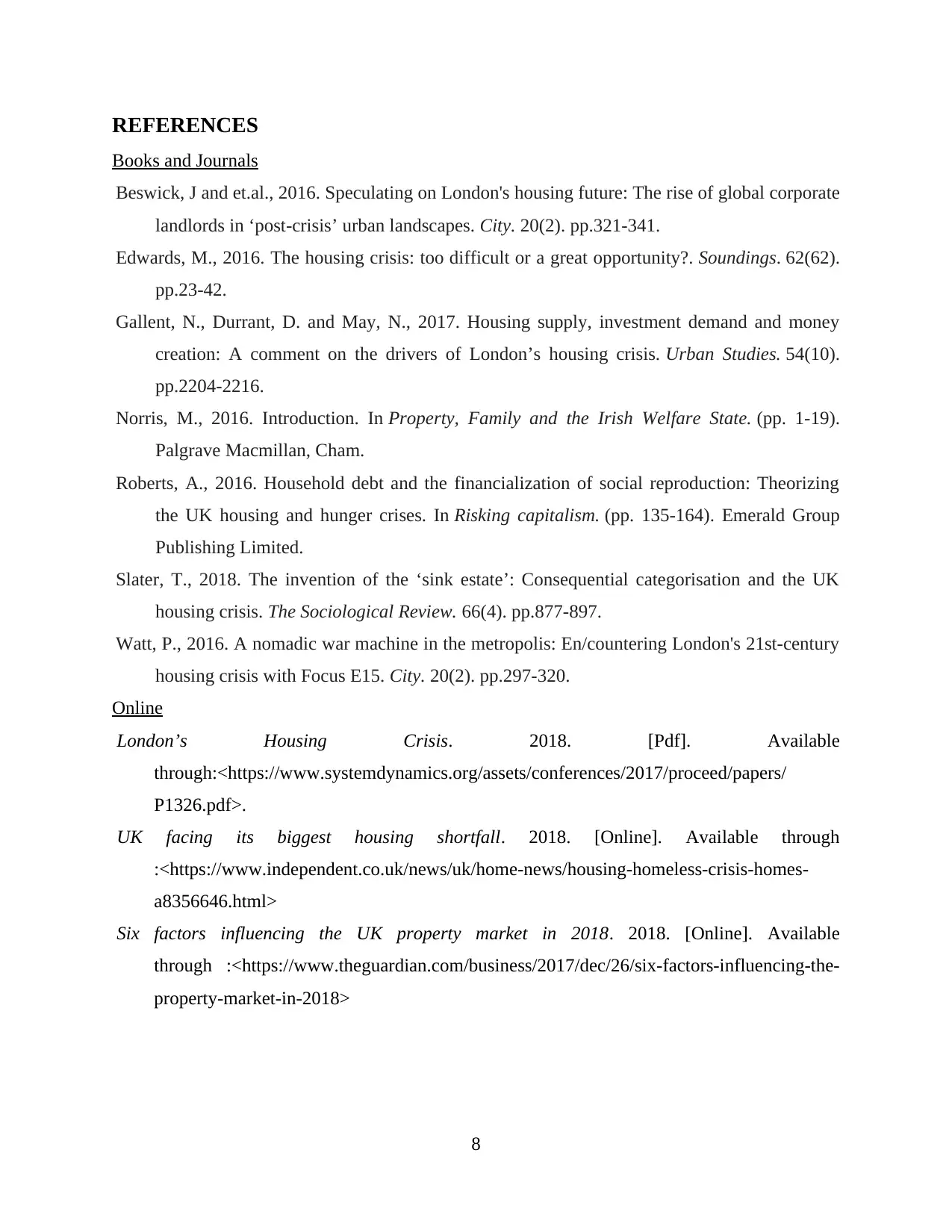
REFERENCES
Books and Journals
Beswick, J and et.al., 2016. Speculating on London's housing future: The rise of global corporate
landlords in ‘post-crisis’ urban landscapes. City. 20(2). pp.321-341.
Edwards, M., 2016. The housing crisis: too difficult or a great opportunity?. Soundings. 62(62).
pp.23-42.
Gallent, N., Durrant, D. and May, N., 2017. Housing supply, investment demand and money
creation: A comment on the drivers of London’s housing crisis. Urban Studies. 54(10).
pp.2204-2216.
Norris, M., 2016. Introduction. In Property, Family and the Irish Welfare State. (pp. 1-19).
Palgrave Macmillan, Cham.
Roberts, A., 2016. Household debt and the financialization of social reproduction: Theorizing
the UK housing and hunger crises. In Risking capitalism. (pp. 135-164). Emerald Group
Publishing Limited.
Slater, T., 2018. The invention of the ‘sink estate’: Consequential categorisation and the UK
housing crisis. The Sociological Review. 66(4). pp.877-897.
Watt, P., 2016. A nomadic war machine in the metropolis: En/countering London's 21st-century
housing crisis with Focus E15. City. 20(2). pp.297-320.
Online
London’s Housing Crisis. 2018. [Pdf]. Available
through:<https://www.systemdynamics.org/assets/conferences/2017/proceed/papers/
P1326.pdf>.
UK facing its biggest housing shortfall. 2018. [Online]. Available through
:<https://www.independent.co.uk/news/uk/home-news/housing-homeless-crisis-homes-
a8356646.html>
Six factors influencing the UK property market in 2018. 2018. [Online]. Available
through :<https://www.theguardian.com/business/2017/dec/26/six-factors-influencing-the-
property-market-in-2018>
8
Books and Journals
Beswick, J and et.al., 2016. Speculating on London's housing future: The rise of global corporate
landlords in ‘post-crisis’ urban landscapes. City. 20(2). pp.321-341.
Edwards, M., 2016. The housing crisis: too difficult or a great opportunity?. Soundings. 62(62).
pp.23-42.
Gallent, N., Durrant, D. and May, N., 2017. Housing supply, investment demand and money
creation: A comment on the drivers of London’s housing crisis. Urban Studies. 54(10).
pp.2204-2216.
Norris, M., 2016. Introduction. In Property, Family and the Irish Welfare State. (pp. 1-19).
Palgrave Macmillan, Cham.
Roberts, A., 2016. Household debt and the financialization of social reproduction: Theorizing
the UK housing and hunger crises. In Risking capitalism. (pp. 135-164). Emerald Group
Publishing Limited.
Slater, T., 2018. The invention of the ‘sink estate’: Consequential categorisation and the UK
housing crisis. The Sociological Review. 66(4). pp.877-897.
Watt, P., 2016. A nomadic war machine in the metropolis: En/countering London's 21st-century
housing crisis with Focus E15. City. 20(2). pp.297-320.
Online
London’s Housing Crisis. 2018. [Pdf]. Available
through:<https://www.systemdynamics.org/assets/conferences/2017/proceed/papers/
P1326.pdf>.
UK facing its biggest housing shortfall. 2018. [Online]. Available through
:<https://www.independent.co.uk/news/uk/home-news/housing-homeless-crisis-homes-
a8356646.html>
Six factors influencing the UK property market in 2018. 2018. [Online]. Available
through :<https://www.theguardian.com/business/2017/dec/26/six-factors-influencing-the-
property-market-in-2018>
8
1 out of 10
Related Documents
Your All-in-One AI-Powered Toolkit for Academic Success.
+13062052269
info@desklib.com
Available 24*7 on WhatsApp / Email
![[object Object]](/_next/static/media/star-bottom.7253800d.svg)
Unlock your academic potential
Copyright © 2020–2026 A2Z Services. All Rights Reserved. Developed and managed by ZUCOL.




